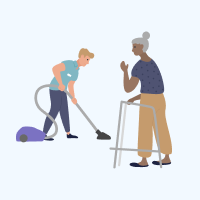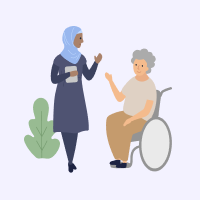You have the right to receive safe, high quality care and services and to always be treated with dignity and respect. Good quality care requires respect, honest communication, and teamwork from everyone involved.
On this page we’ll explore:
What are my rights?
The Charter of Aged Care Rights sets out the 14 rights that protect people receiving aged care. Everyone receiving aged care services has the same rights, regardless the type of care.
Your rights, and how your provider will support them, should be included in your Home Care Agreement (for Home Care Packages) or Resident Agreement (for aged care homes) with your service provider.
I have the right to:
- be safe and high quality care and services
- be treated with dignity and respect
- have my identity, culture, and diversity valued and supported
- live without abuse and neglect
- be informed about my care and services in a way I understand
- access all information about myself, including information about my rights, care and services
- have control over and make choices about my care, and personal and social life, including where the choices involve personal risk
- have control over, and to make decisions about, the personal aspects of my daily life, financial affairs and possessions
- my independence
- be listened to and understood
- have a person of my choice, including an aged care advocate, support me or speak on my behalf
- complain free from reprisal, and to have my complaints dealt with fairly and promptly
- personal privacy and to have my personal information protected
- exercise my rights without it adversely affecting the way I am treated
Can someone help me to understand my rights?
Your aged care provider is required to help you understand your rights before you begin receiving services.
Your provider is also required to sign the Charter of Aged Care Rights and give you the option of signing it, too. If you don’t sign it, you can still receive care and services. If you do sign the Charter, you acknowledge that you have received it and understand your rights.
If you want to speak with someone other than your provider, you can get independent advice. You can speak with an advocate about your rights, or you can visit the Older Persons Advocacy Network website.
The Charter of Aged Care Rights booklet can also help you understand your rights, and how to exercise them.
Your aged care rights coexist with other rights
It’s important to know that you still have all the same legal rights as every Australian. For example, you have rights to privacy, consumer rights, and the right to be free from discrimination under relevant laws. The rights described in the Charter are in addition to these.
What should I do if I have concerns?
If you are made to feel unsafe or uncomfortable or have a concern about your rights, you should tell someone. This could be your aged care provider, a staff member, a friend, family member, an aged care advocate, or anyone you trust.
If you are concerned about the quality of your or someone else’s care, or believe that rights are not being upheld, it is important to talk about it.
You should talk to your aged care provider first. It’s okay to complain. Just as positive feedback can reinforce things that work well, your complaints can help improve care and services.
If you are not comfortable talking to your provider, or feel that they haven’t resolved your complaint, these organisations can help you:
National Aged Care Advocacy Program (NACAP)
You have the right to call on an advocate of your choice to represent you when you interact with your service provider.
Find out more about advocacy.
Aged Care Quality and Safety Commission
If you, your carer, or anyone else is concerned about the care or services you receive, you can make a complaint to the Aged Care Quality and Safety Commission.
Read more about how to make a complaint.


